Unlocking the Mystery of Writing a Musical
A Conversation with Carson Kreitzer and Matt Gould
Recently, I spent two days in a convening learning, among other things, about the partnership between Carson Kreitzer and Matt Gould. I was enchanted by their collaborative energy and I thought their discussion of what it takes to make a new musical these days was pretty instructive. Carson and Matt kindly took some time to talk with me about their new musical, Lempicka, and what it takes to get made.
P. Carl: A couple of things really came out of listening to you guys talk about making a musical together. Super basic, but how hard is it to actually make a musical that gets produced? Could you just talk about the process you’ve been in, the length of that process, and some background on this project?
Matt: Our partnership started when Carson and I met during the Composer-Librettist Studio at New Dramatists. We were paired up for the very first week of the Studio and asked to write a song together. It was kind of like magic—right away, we just really hit it off. We were both super type-A, but the kind of super type-A that works really well together. We spent the next two weeks hoping that we’d get a chance to work together again, which of course we never did because that’s not the way the Studio works.
Carson: The Composer-Librettist Studio is seven writers and seven composers and you write a song with each person by the end of the workshop. Ben Krywosz runs it, and it really just changed the way my head worked, mainly because I got to meet Matt and we had that wow-ey experience. On the last day, I called him up and I was like “meet me beforehand for coffee.” I brought this art book with me of Tamara Lempicka and I slid it across the coffee shop table at him. I believe I said, “I’m thinking Evita meets Sunday in the Park with George, what d’ya think?”
Matt: And I was like, DUH! Of course! That’s the best idea ever!
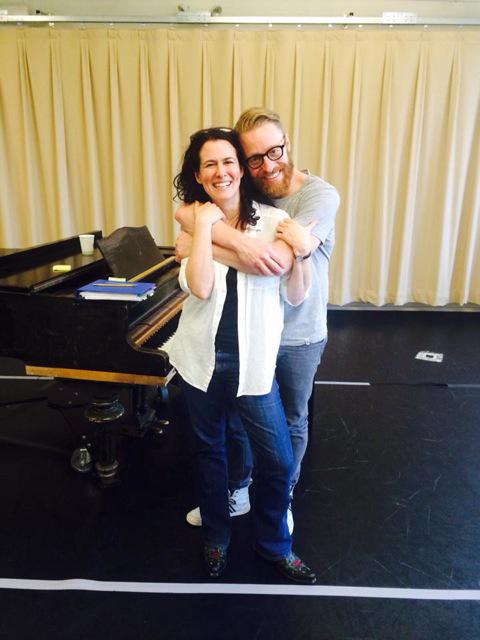
Carl: So it all seems pretty straightforward at this point. But my experience is that making a musical has a certain mystery to it, so what was the process from there?
Carson: Well, we did start work on our own and it’s so difficult to get all the elements in place. So, Matt and I did some work at New Dramatists and we kicked around the ideas, and we figured out what the story we wanted to tell was. We started writing a couple songs, and pretty rapidly I realized that I had talked Matt into something insane and that we just couldn’t do this on our own. That it’s so much bigger than a play. That’s the main thing I have learned working on musicals. With a play you can invite your friends over to your house to hear it and make a pizza, but with a musical that is just not possible. So we are very lucky that New Dramatists had this program called Full Stage USA—a collaboration that connected playwrights with producing companies—and Yale Rep happened to be a collaborator hoping to work on a musical. The gods smiled upon us, and that has been the way that Matt and I have gotten to be in the same place and work together for several years now on this project.
Matt: We are into about year four approximately.
Carson: Because Matt and I have always lived in different places, we’ve got this really intense way of collaborating. Where New Dramatists or Yale Rep puts us in a room with a piano and we just spend hours and hours, and days and days, writing, and scribbling, and throwing paper over my shoulder, and Matt putting on headphones, and banging away on his keyboard. This musical could not have happened without that kind of support and without that intense time collaborating together.
There is something about music that is just elusive. You can have all the lyrics, and you can listen to it in the room, and I can sing it, and you can feel it— but for some reason when you hear the thing as a whole, when you hear a song, it does a certain amount of work on you that words just don’t do all by themselves. —Matt Gould
Carl: Four years is a long time in the scope of an artist’s life. What would you say, Carson, as a playwright, that’s twice or three times the amount of time that it would take you to write a play?
Carson: Yeah, probably twice for me, but I am a heavy researching playwright.
Carl: So how you do you break down those years? What are you doing in year one? What are you doing in year two?
Matt: Well, you really have to take it in chunks. We go ahead and say let’s try to get through Act One by such and such date, or at least get a general sense of what Act One is. I think from my experience writing a couple of musicals now, you have to just dive in and figure it out. Try to find the high points and the low points, and how does Act One end? There are, I think, certain hard and fast rules for musical theatre. And we go, “Okay, we’ve written Act One! Let’s do a reading of Act One!” Let’s get a bunch of notes from the reading of Act One. Now let’s try to do Act Two, knowing that we haven’t fully fixed Act One yet. We do Act Two, and we get notes on that and we realize something that we set up in Act Two, we didn’t set up in Act One. Now we’ve got to go back and try to connect the dots. After that, we do a workshop of that whole thing. Part of the reason that it takes so much time is we are dealing with a cast of a minimum of twelve or fourteen people. In order to really hear it and know if it is working, you have to get those fourteen people in a room, which costs a lot of money and takes a lot of time. You have to teach them all the songs and all of the harmonies. It takes a week or two to get everyone wrapped around it. Then you have to put it on its feet and try to listen to it.
I think on top of all that, there is something about music that is just elusive. You can have all the lyrics, and you can listen to it in the room, and I can sing it, and you can feel it— but for some reason when you hear the thing as a whole, when you hear a song, it does a certain amount of work on you that words just don’t do all by themselves. And that you can’t plan for. There’s a certain amount of aiming for something that you have to do. Thinking you might have it, and you don’t really know if you got it. I think there are still one or two songs in the musical that despite the fact that we’ve done five very complicated readings over the course of four years, I don’t think we’ve heard right yet. So I still don’t know if the song works for our show or if the song just doesn’t work and we have to rewrite it. So there’s something mystical about musicals that’s sort of hard to pin down. It just takes a lot of time, and a lot of resources to suss out.
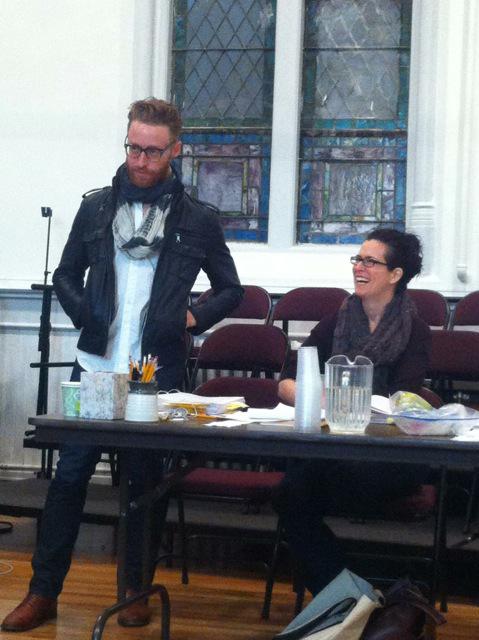
Carl: Carson, you mentioned that you really feel like as a writer you found yourself in this process of writing a musical—that this was the form that made the most sense for your writing. Can you talk a little bit about that?
Carson: I’ve always been a playwright who is obsessed with language, sound, and syllables, and where the weight falls, and little internal rhymes that fall within a line. I am used to being the hypersensitive one in the room, who’s like “Oh, no, actually, that little tiny piece right there, that’s actually important, can we pay attention to that?” And you just feel crazy. With musicals, that is how they are built—the meaning is contained in the sound of the words and the vowels. I know we had some early discussions, where Matt would help me make certain things more singable—I feel like I’ve gotten better at that through our process, and having a better sense of which vowels you can really soar on. It’s all conveyed in the language in a really satisfying way for me. In working with Matt, the language gets elevated in this incredibly joyful way that I never dreamed was possible as a playwright. It feels like it’s asking too much to have that much contained in your words, and that much emphasis put on them, but when they are lifted with music you can do things with much fewer words. It takes every synapse firing in my brain in this beautiful, satisfying way.
Matt is an absolute genius, and sheer joy as a collaborator. Working with Matt is definitely the most fun I have ever had as a writer, and probably the hardest I’ve worked for extended periods. I can’t put in the hours that Matt and I put in together by myself because I just fry. When there’s somebody else there kicking it back and forth with you, the electricity catches and you just keep going, and keep going, and keep going, and sometimes you get that breakthrough that is worth the fourteen hours you’ve spent in the room. That is the best feeling there is!
Carl: As somebody who has read your plays for a long time, I love that you’ve found a place where the nuance of the sound, the syllable, and the language is articulated for you. It’s such a wonderful evolution of your own thinking about the writing—it’s really exciting! Matt, you’ve worked on a number of musicals; has this process been pretty much like others? Or has this been different because of the collaboration with Carson?
Matt: It’s different every time because you can’t rely on anything that you’ve learned before to inform what you’re doing now. There are certain technical things, like this is going to take a really long time, or casting this is going to be really hard—there are some generalities you can draw, but Carson is really generous with her praise of me, and it’s extremely mutual. Carson is one of the most intelligent and passionate human beings on the planet. Her sense of rational specific thought coupled with my less rational, less specific, just emotive frame is a very different kind of mixture than anything else I’ve ever worked with. I’ve worked with other people. I’ve done things by myself, but the chemistry of working with her makes it a very unique experience. That’s what’s so interesting about musical theatre—it’s a highly collaborative art form, it’s not something you can do by yourself. Even if you write the play all by yourself, you still have to rely on the director, the designer, and all kinds of people to weigh in. That’s also what’s beautiful about the form; in many ways it’s like a microcosm of life, where all of these different ideas and all of these different perspectives come together in a room and make something beautiful. It’s partly why I love the form so much—I believe that if we can do it in the room, as artists, then we can do it in the world.
Carson: Working with Matt has really pushed me toward writing in a more emotional place. My characters are always very intellectual, with lots of walls up. Early on, when we were just feeling our way through, I would describe what was going on and Matt would say, “but what is she feeling? Where is she emotionally in this?” That’s where it lives with music. You can’t hide in intellect and keep yourself from being devastated. My characters often use too much language to keep the devastation at bay, and in a musical you can’t—you just need to be there when the wave breaks.
And what Matt is saying about really wanting to get the piece out there is—the stakes are so much higher and the reach is potentially so much wider with a musical. I am somewhat obsessed with troublesome women, and this story just feels really important to get out there. —Carson Kreitzer
Carl: In this process, the collaboration that you describe, it’s almost like a marriage. Fourteen hours in a room together, and you guys still like each other, which I’m very impressed by. Have there been moments where it felt like the process was going to stall or stop?
Matt: There are challenging moments. I think relating it to a marriage is exactly right—it is a marriage, and the work is our baby. And I haven’t raised children, but I imagine that people have certain places where they agree—the child should go to school here, or the child should wear these kinds of clothes—so there are certainly challenging moments. Carson and I have become more and more adept at communicating with each other. I’ve never felt at any point like oh “this is all going down the tubes, this was for naught.” I think that we have both felt a supreme dedication for making sure our baby is well taken care of, well fed, well dressed, and is going to get the very best life that she can possibly have. And even in the places where we don’t perfectly agree, we continue to search for the common ground, and continue to search for ways for us to understand each other better, and to get closer to what it is that we want.
Carson: No matter what, if we’re disagreeing about how to get from point A to point B, we both know very deeply that this is all out of love for this project and trying to get it to happen the right way. Matt and I are both a little impatient, so any trepidation is mostly around when can we get in the room next? When is this happening next? When can we have actors, and is that happening soon enough?
Carl: This is always a question I have with musicals, when is it finished? What does done look like at this point?
Carson: Done looks like the curtain going up and an audience being there, but that’s probably not even done.
Matt: I think we’re telling a very large story that I want to be able to share with a large audience. The other thing with a musical is that when you invest years and years and lots and lots of resources into it—I would hate for the end of its life to come after four weeks of a single production. Five or six years of work for four weeks. The goal is to be able to share this with as wide an audience as possible, so I think like any theatre, it’s not done until it’s done. Carson and I want to get as close as we can to telling the story clearly and specifically and epically and emotionally and smartly as we can and then we want to get a team on board that is able to help us execute our vision, and then we want to bring it to audiences as wide and far as possible. And I think that the satisfaction will come when girls in their high school talent shows are singing “Beauty” and little girls on America’s Got Talent are singing a lesbian love song to all of America, that is when it will be done.
Carson: And what Matt is saying about really wanting to get the piece out there is—the stakes are so much higher and the reach is potentially so much wider with a musical. I am somewhat obsessed with troublesome women, and this story just feels really important to get out there. That she is really a disruptive force that I want the world to know about. I want little girls to know growing up that there are these stories out there—that you can remake your life the way you want. You won’t necessarily get everything you try for, but try. Reach.
Carl: Do you think you’re going to do another project?
Matt: Hell yeah! Of course.
Carson: I would love to.
Set in Paris against the backdrop of the rising fascist tide, Lempicka follows artist Tamara de Lempicka's path through the chaotic upheavals of the 20th century. Fleeing the Russian Revolution as a nineteen-year-old bride, she lands in Paris a penniless refugee, and transforms herself into a rising star of the art world. But when she falls into a forbidden love affair with a prostitute— her muse, the breathtakingly beautiful Rafaela—Tamara is forced to choose. Will she risk it all in pursuit of love and art? Or cling to the security of money and fame? And what could security mean, in a world about to shatter? Lempicka was commissioned by Yale Repertory Theatre in partnership with Full Stage USA at New Dramatists, a program made possible by the Andrew W. Mellon Foundation. It has been developed with the support of New Dramatists and Yale’s Binger Center for New Theatre.


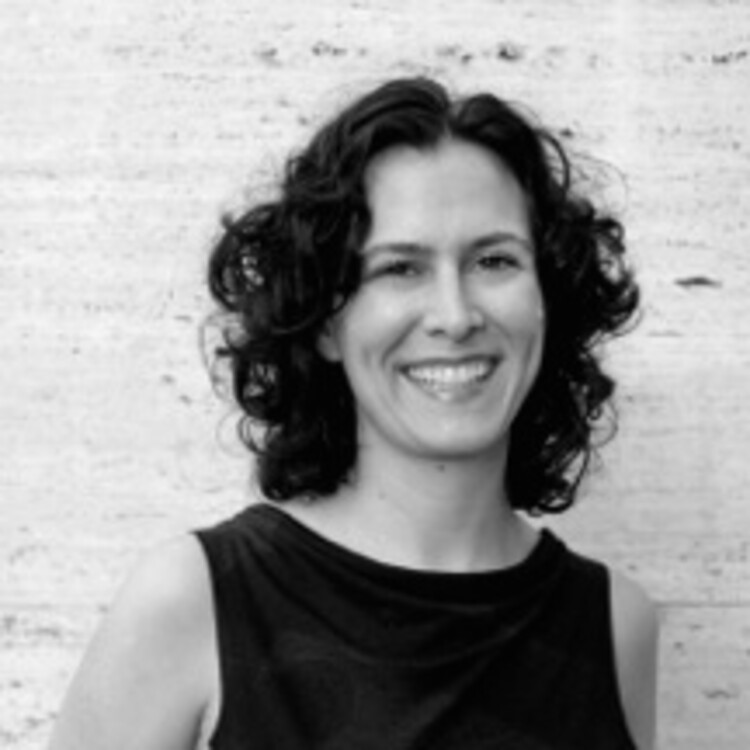
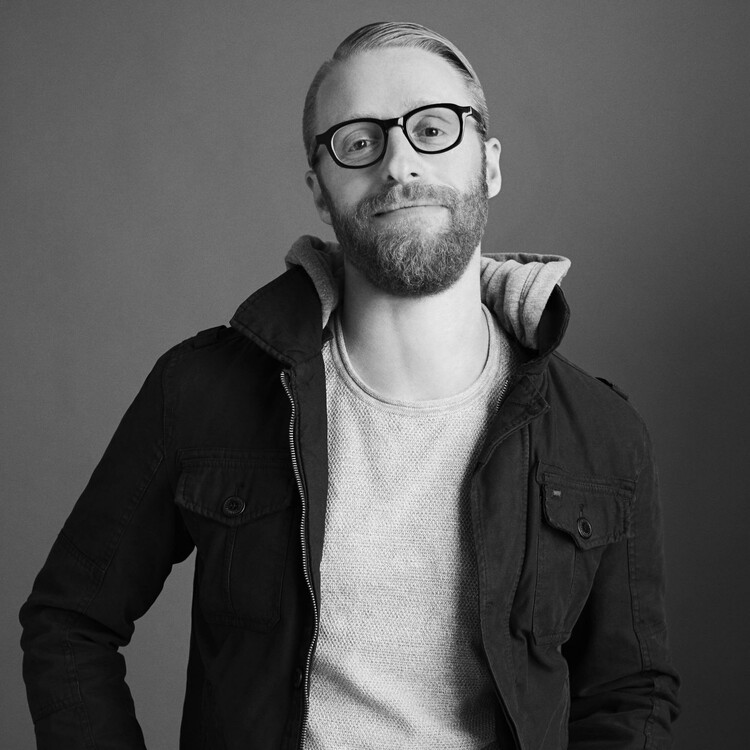
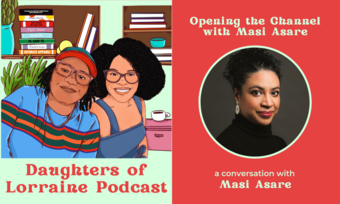



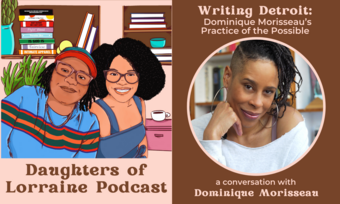

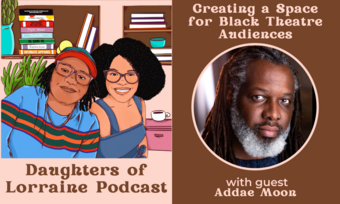

Comments
The article is just the start of the conversation—we want to know what you think about this subject, too! HowlRound is a space for knowledge-sharing, and we welcome spirited, thoughtful, and on-topic dialogue. Find our full comments policy here